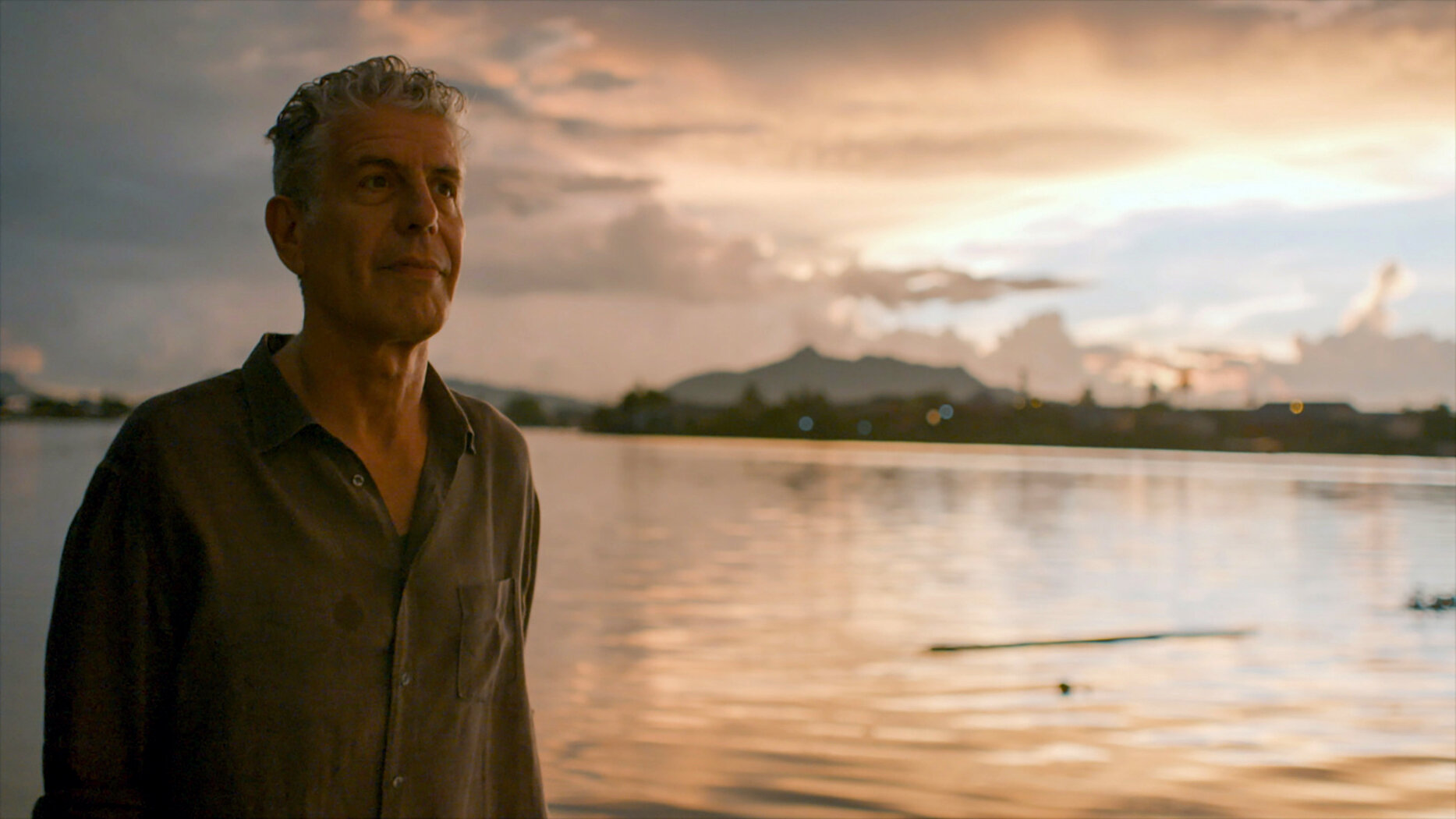Content warning: suicide
Anthony Bourdain sits on a boat, gliding through the waterways of Hong Kong, and remarks that he thinks he’s happiest in the moments when life is most like a film.
American documentary filmmaker Morgan Neville’s Roadrunner: A Film About Anthony Bourdain (2021) gives Bourdain’s musings a tangible reality. The documentary, which begins with the launch of his entertainment career and ends with the aftermath of his suicide, translates life to film quite literally.
Neville certainly draws from ample material. A friend reminisces about how “Tony” was a walking movie encyclopedia, pulling references and quotes out of thin air. Another colleague comments on how desperately Bourdain sought out experiences that mirrored his favorite films, like Apocalypse Now (1979) and In The Mood For Love (2000). And, of course, as a prominent entertainer, Bourdain himself always seemed to be followed by a camera, and Neville takes advantage of that. He fills Roadrunner with breathtaking and intimate archival footage that seems almost too good to be true.
The documentary is authentic—for the most part. Neville’s decision to use an AI-generated version of Bourdain’s voice to read three lines—lines Bourdain wrote in an email before his death—caused controversy and sparked a debate on documentary ethics. Though the computerized-sounding tone of the words being spoken clearly distinguish AI from Bourdain’s actual voice, many critics have declared Roadrunner’s legitimacy to be compromised.
I would agree, but for different reasons. Making someone’s life “cinematic” requires a story to be told. Theoretically, at the core of any story is conflict, which necessarily means “heroes” and “villains,” “protagonists” and “antagonists.” In reality, characters are complex and ambiguous, but Roadrunner doesn’t hesitate to assign living, breathing people to those reductive categories, and that is where the real problem arises.
As the film begins to approach Bourdain’s suicide, Asia Argento—Bourdain’s former romantic partner—is introduced. The way Roadrunner deals with her personhood and her relationship to Bourdain is troubling. Interviewees, like Bourdain’s close friend Alison Mosshart, recall the toxicity of the relationship, and in particular, the way in which long-time crew members became dissatisfied when Argento directed the Hong Kong episode of Bourdain’s travel and food show, Parts Unknown. And, conveniently, a segment on Argento’s appearance in tabloids with a new boyfriend and Bourdain’s reaction is showcased shortly before interviewees discuss his suicide. Her appearance in his life is very clearly used as a marker in the film to indicate the most drastic “fall” in Bourdain’s storyline.
Neville embeds an escape route from Argento’s implied villain characterization, lest the documentary draw the ire of those who may label it as shallow and problematic, through a short clip that shows a colleague and friend of Bourdain’s emphasizing that “he killed himself.” Still, though, the narrative surrounding Argento simulates a sexist trope, and is perhaps more upsetting to watch because the source material is taken from the lives of two very real people, as opposed to fictional characters. To imply that Argento had a hand in Bourdain’s death, as Roadrunner does with its calculated placement of the Argento saga, is dangerous.
Ultimately, however, both the hero and villain of Bourdain’s narrative is embodied by Bourdain himself, and Roadrunner doesn’t hesitate to delve into the depths of Bourdain’s darkness. Friends and colleagues remember moments of extreme cruelty by their beloved Tony. He fires a cameraman that had been on his team for years on a whim. Not even the worst parts of Bourdain’s vanity are censored; his friend and fellow chef David Chang recounts the moment when Bourdain callously told him that Chang would never be a good dad. Thus, the documentary shows how Tony becomes the central antagonist in the sphere of his own existence.
Simultaneously, Bourdain also reigns as the film’s protagonist, a hero one cannot help but celebrate and mourn. Thousands of admirers brought flowers, cards, and other tribute items to Les Halles, the restaurant where Bourdain worked as the executive chef before his rise to stardom. The film includes numerous interviews of his friends and coworkers singing praises of his creative, social, and political abilities. Scenes from the 2011 Haiti episode of another one of Bourdain’s travel and food shows, No Reservations, shows Bourdain organizing food relief for those impacted by a devastating earthquake and an impending hurricane. Through it all, Bourdain philosophizes on what it means to be a powerful, wealthy man when so many others live in suffering.
Stylistically, Neville portrays Bourdain’s paradoxical qualities through contrasting shots of Bourdain surrounded by crowds and also Bourdain laying alone in bed. Audiences often see him in long shots, a lone figure against the vast landscapes of the entire world. Through content and form, Neville tries to showcase Bourdain’s real, human ambiguity and his attempt is laudable. However, despite the visually pleasing nature of the cinematography, the conclusions the film draws are not always coherent. Namely, Neville grants Bourdain a depth and level of complexity that he refrains from giving to Argento for the sake of narrative conflict.
When summing up the life of a passionate man, the responsibility falls on filmmakers, writers, and artists of various disciplines to create ethical art. Neville’s Roadrunner selectively succeeds at doing so. Ultimately, the documentary fails where it simplifies complexity for the sake of a convenient narrative arc.


